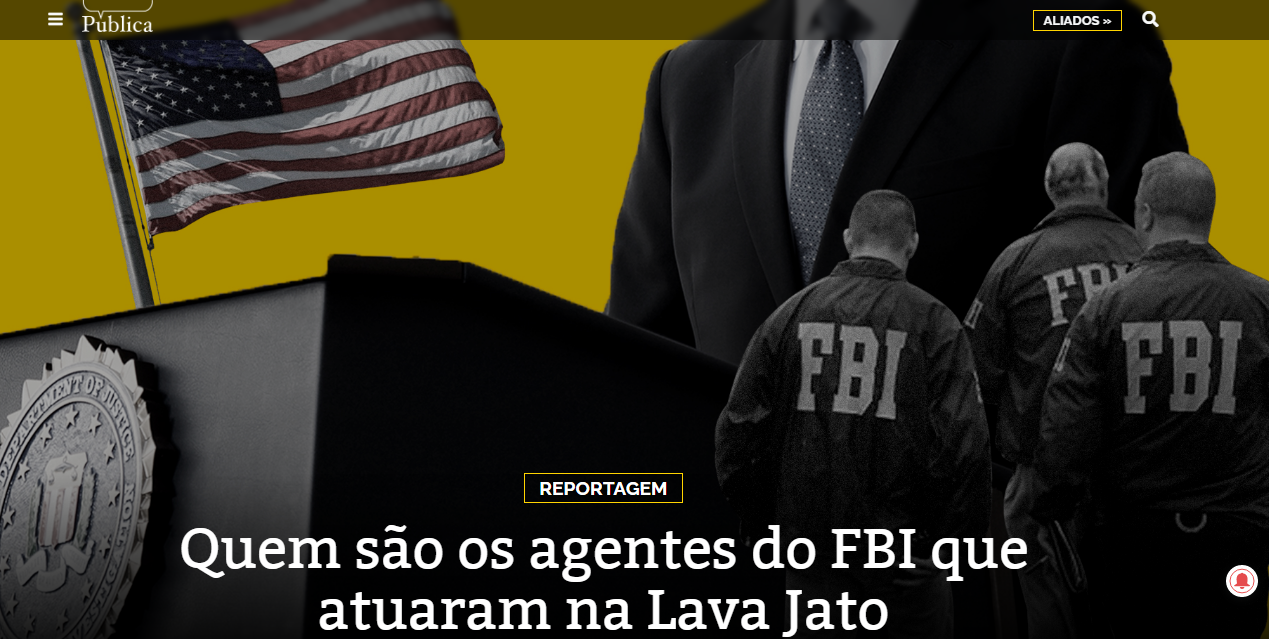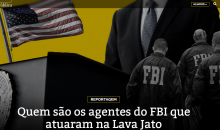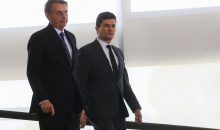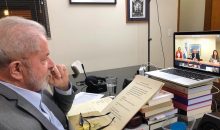10 topics to understand the US role in Car Wash Operation

Agência Pública’s website, its editor Natália Viana and The Intercept Brasil have carried out a detailed investigation that reveals the important role the United States played in Car Wash, frequently considered the largest anti-corruption investigation in Latin America. The meddling occurred via the United States Department of Justice (DoJ) and the FBI.
It’s important to remember that Car Wash starred the Brazilian construction company Odebrecht, the former judge Sergio Moro and the former president Luiz Inácio Lula da Silva in its leading roles. Besides, it featured the removal from office of Dilma Rousseff (2016), the imprisonment of Lula (2018), and, finally, the electoral win of Jair Bolsonaro – who had taken the fight against corruption as one of his campaign’s approaches.
The inquiry revealed many things. The most important, undoubtedly, is that the prosecutors in charge of the Car Wash in Brazil made an illegal cooperation deal with the FBI in 2014 – during Dilma Rousseff’s administration – that continued up to 2016. Being illegal, the deal was concealed from federal authorities. The agreement granted the FBI agents unlimited access to the investigation reports and key data. Another very interesting fact: there were chats between the Brazilian prosecutors and the FBI agents to share the money from the fines imposed to Petrobras, as a punishment for the acts of corruption within the enterprise.
At the beginning of July, the Workers’ Party denounced the agreement at the Federal Prosecutor’s Office. The party’s lawyers Eugênio de Aragão and Ângelo Ferraro pointed out that the Car Wash prosecutors acted illegally as they disobeyed the Justice Ministry to carry out a handpicked proceeding against former president Lula.
Last month, the Intercept had already published private chats between the public agents who took part in Operation Car Wash, showing the partiality of the investigation directed against the Worker’s Party and which intended to arrest Lula.
The journalist Natália Viana has reminded us of a key fact to understand the dynamics of these processes: the current head of the FBI International Corruption Squad, Leslie Backschies, has publicly acknowledged her office’s role in toppling down governments that were not submissive or blocked US interests.
In the following, we have reproduced the most important parts of Agência Pública’s and The Intercept’s investigative work.
1) Previous communications
Since at least 2015 there have been communications between the US Department of Justice and Deltan Dallagnol, a Brazilian federal prosecutor. In February that year, for instance, Rodrigo Janot traveled to the US accompanied by Dallagnol and other prosecutors to present the Car Wash case and discuss a cooperation agreement with the US.
2) Ties with the FBI
George “Ren” McEachern, then chief of the International Corruption Squad, said that the bureau started to “seek for countries which were willing to invite their agents to evaluate the corruption investigations linked to the United States”, in 2014.
In October 2015, Dallagnol and his peers coordinated a visit of the Department of Justice prosecutors and FBI agents. On October 5, “a delegation of at least 17 Americans visited Curitiba to chat with members of the Prosecutor’s Office and also with the lawyers of the executives who were being investigated in Brazil. Among them, American prosecutors of the Department of Justice (DoJ) and FBI agents (…) All the negotiations occurred at the headquarters of the Prosecutor’s Office in Curitiba. In four very busy days of working, they received detailed explanations about whistleblowers of the likes of Alberto Youssef and Nestor Cerveró and had meetings with lawyers of 16 other whistleblowers that had signed leniency agreements between the end of 2014 and the beginning of 2015, in exchange of house arrest, including black-market bankers and former Petrobras executives.
3) Concealing
The Car Wash task-force concealed this visit of the members of the DoJ and the FBI from government authorities.
However, the Justice Ministry found out about the American visitors. According to a bilateral treaty, cooperation between Brazil and the US in judicial matters (like requesting proof from bank entries, searching and seizure, inquiring on suspects or defendants, and requesting extraditions) usually happens after a formal collaboration request takes place. The procedure was established following the Treaty on Mutual Legal Assistance in Criminal Matters, a bilateral treaty signed in 1997. José Cardozo was the head of the Justice Ministry then, under Dilma Rousseff’s administration (Workers Party).
Eduardo Cardozo told Agência Pública that “the federal police had warned me there was a group from the United States establishing communication with authorities in Curitiba. The police asked then if we had authorized this. I did not know anything about it”. Cardozo said that, when he talked to the Chief Prosecutor Rodrigo Janot, he had assured him it “was a meeting with academic purposes”.
4) “Additional” evidence
However, the documents got by the Intercept show that American agents were going to Curitiba to “gather additional evidence on the Petrobras case” and “talk to the lawyers about their clients’ cooperation with the investigation happening then at the US”.
On March 12, 2020, the Intercept Brasil revealed that “chats analyzed in partnership with Agência Pública have shown that the task-force led by prosecutor Deltan Dallagnol had made everything within reach to ease the American investigation, even by violating international treaties and the Brazilian law”.
5) Threatens
After the visit, prosecutors suggested ways for the US to go around Brazil’s Supreme Court and inquire Brazilian executives. A Telegram message said: “Now we have a way to convince companies and people of giving in facts: by threatening to report to “American authorities” on corruption and international crimes (lots of laughs)”.
Prosecutor Orlando Martello wrote to Americans encouraging them to question the whistleblowers within the United States territory. Thus, they wouldn’t have to obey Brazilian law. Martello also offered to “pressure them so they would go to the US, especially those who did not have financial issues, telling them it could be a good opportunity”.
6) The upper hand
Later, the Chief Prosecutor was taken aback when he found out American agents were already questioning the case’s witnesses in the United States. Dallagnol told him it was late: “The United States has the upper hand”, he said in a Telegram message published by The Intercept Brasil. Dallagnol stated then there was no turning back: the American’s investigation was a fact.
7) Collaboration agreement
The following year, DoJ prosecutors and FBI agents returned to Brazil to question the first Car Wash whistleblowers. This time, taking a signed collaboration agreement along. In Rio de Janeiro, they inquired Nestor Cerveró and Paulo Roberto Costa for 9 hours each.
During the same visit, they also stopped by Curitiba where they heard the testimony of the black-market banker Alberto Youssef for 6 hours.
8) Fine to Petrobras
In October 2015, US government agents began to say, in private meetings, they were considering the imposition of a 1.6 million dollars fine to Petrobras.
9) Assets sharing of fines
The Car Wash prosecutors talked about sharing the fine imposed on Petrobras with the Americans since 2015. During the Americans’ second visit, Dallagnol seemed content: “We talked to them yesterday about the (effective) assets sharing of fines linked to the proceedings against Petrobras”, he said in a Telegram message. And he added: “And there is a good chance regarding some of these sums”.
The leaked chats show the Petrobras’ assets sharing guided the bilateral cooperation with the US Department of Justice.
During the bilateral and internal negotiations about the collaboration with the Department of Justice regarding Petrobras, the interest in obtaining a share of the fine imposed in the United States had always been decisive. At the end of 2015, after the rapid advance of direct negotiations between the Department of Justice and the whistleblowers, Dallagnol explained to the Augusto Aras (a prosecutor) that he intended to slow the pace of the American inquiries to have better conditions when negotiating the assets sharing. “The reason why we have held it up so far is that we are still in doubt whether we ease up things and also because we wanted to negotiate the assets sharing”, Dallagnol said on December 17th.
10) Funding anti-corruption projects
From that moment on, Brazilian prosecutors discussed the possibility of using some of the fines to manage a billionaire fund, with which they would support anti-corruption projects.
At the same time, Dallagnol and Roberson Pozzobon (prosecutor, also a member of Car Wash) discussed opening an enterprise with the same goal: “We are organizing conventions and events and also taking our share [of the money], right?”, Dallagnol texted his wife in a Telegram message, also published by The Intercept Brasil.



